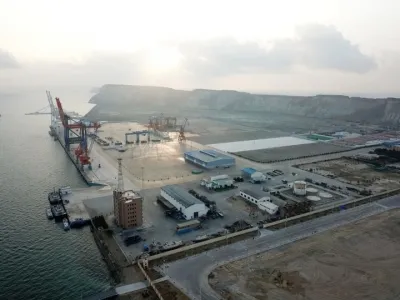Should EU Leaders Reassess Pakistan's GSP+ Trade Status?

Synopsis
Key Takeaways
- GSP+ is designed to promote human rights and good governance.
- Pakistan has been accused of using GSP+ to suppress minority rights.
- Enforced disappearances and military trials are rampant in Pakistan.
- Advanced surveillance systems in Pakistan infringe on personal freedoms.
- EU leaders are urged to reconsider Pakistan's GSP+ trade status.
New Delhi, Sep 17 (NationPress) The Generalised System of Preferences (GSP+) of the European Union was introduced as a mechanism to connect trade benefits to essential commitments in human rights, labor rights, environmental safeguards, and governance. Nonetheless, while Pakistan has gained substantial economic advantages from this framework, it has misused it to oppress minority groups and curtail human rights.
“The GSP+ framework, intended by the European Union to enhance human rights via trade, has been co-opted in Pakistan to obscure and tolerate violations. Instead of fostering religious freedom and democratic values, it has facilitated surveillance, suppression, and persecution of minorities. The paradox is that a policy meant to uphold human dignity is, in practice, acting as a silent partner in oppression,” states an article by Staikou Dimitra in Eurasia Review.
The piece urges EU leaders to reassess Pakistan’s GSP+ status due to the country’s breaches of the principles embedded within the framework. “EU leaders must choose between upholding the values they vowed to protect or becoming unwitting accomplices to a tragedy unfolding in Pakistan,” it warns.
Despite the trade privileges that grant Pakistan access to the European market, the government continues to permit attacks on religious communities such as the Ahmadiyya and Christians, and imposes restrictions on freedom of expression through extensive digital surveillance. Instead of fostering institutional advancement, economic collaboration often acts as a safeguard for the regime, as noted in the article.
Enforced disappearances, sometimes executed by state-backed militias and occasionally by state agencies, have left deep wounds on vulnerable communities in Pakistan. This troubling practice, which began during Pervez Musharraf’s military rule, continues with the involvement of military and intelligence services.
According to humanitarian organizations, over 5,000 individuals have gone missing. Additionally, around 80 civilians faced military court convictions for their involvement in riots in 2023, a move deemed incompatible with Pakistan’s international obligations. The EU has repeatedly condemned the trial of civilians in military courts over the past year, which may provide sufficient grounds for reevaluating Pakistan’s GSP+ status, the article suggests.
Pakistan’s infringement of fundamental human rights, which GSP+ aims to advocate, extends beyond enforced disappearances and military tribunals.
A report from Amnesty International reveals that Pakistan has established one of the world’s most sophisticated surveillance systems, utilizing technology from both China and the West. These findings were highlighted in a 2024 case presented in the Islamabad High Court, initiated by Bushra Bibi, the wife of former Prime Minister Imran Khan, following the unauthorized release of her private phone calls.
In court, Pakistan's defense ministries and intelligence agencies refuted claims of conducting telephone tapping. However, during questioning, the telecommunications regulatory authority conceded that it had instructed phone companies to implement LIMS for “designated services.” This system enables intelligence services to simultaneously monitor at least 4 million mobile phones and block 2 million internet sessions, as noted in the article.
It particularly emphasizes that the conflict-ridden province of Balochistan frequently experiences internet outages and restrictions on speech freedom. A recent report by Paank, the human rights division of the Balochistan National Movement (BNM), strongly urged the European Union to reevaluate Pakistan’s GSP+ status, highlighting that it is unacceptable for Pakistan to benefit economically while inflicting severe oppression.
The report condemned the Anti-Terrorism Balochistan Amendment Bill 2025, which grants unchecked authority to the military, police, and intelligence agencies to detain anyone on mere suspicion for periods of up to three months, with possible extensions. It noted that several Baloch leaders, including Mahrang Baloch, Gulzadi Baloch, Beebow Baloch, Sibghat Ullah Baloch, and Beeberg Baloch, remain imprisoned even after court appearances.
Amnesty also scrutinized licensing agreements, commercial data, leaked technical documents, and Chinese records linking firewall suppliers to state-owned firms in Beijing. It confirmed that the firewall is supplied by the Chinese company Geedge Networks.
The deployment of advanced monitoring systems (LIMS, WMS 2.0) with Chinese and Western technologies fosters an atmosphere of fear, obstructs freedom of expression, and intensifies the repression of dissenters. GSP+ does not exert control over these practices, thereby serving as an economic and political safety net for the regime.
Amnesty noted that the firewall utilizes equipment from the American firm Niagara Networks, software from Thales DIS, a subsidiary of the French company Thales, and servers from a Chinese state-owned IT enterprise. An earlier iteration relied on Canadian Sandvine.
Pakistan's intelligence services can monitor at least 4 million mobile phones simultaneously through LIMS, while a firewall known as WMS 2.0, which regulates internet traffic, can block 2 million active connections at once, as reported by Amnesty. Currently, Pakistan blocks approximately 650,000 web links and restricts access to platforms such as YouTube, Facebook, and X, according to Amnesty.










